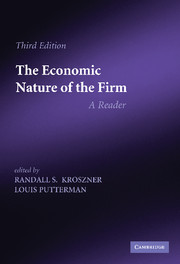Book contents
- Frontmatter
- Contents
- Editors' preface
- Reintroducing The Economic Nature of the Firm
- Part I Within and among firms: the division of labor
- Part II The scope of the firm
- Part III The employment relation, the human factor, and internal organization
- Part IV Finance and the control of the firm
- 19 Mergers and the market for corporate control
- 20 Agency problems and the theory of the firm
- 21 Theory of the firm: managerial behavior, agency costs, and ownership structure
- 22 Organizational forms and investment decisions
- 23 The rise in managerial stock ownership
- 24 Executive compensation as an agency problem
- 25 An economist's perspective on the theory of the firm
- 26 Ownership and the nature of the firm
- References
- References
24 - Executive compensation as an agency problem
Published online by Cambridge University Press: 05 June 2014
- Frontmatter
- Contents
- Editors' preface
- Reintroducing The Economic Nature of the Firm
- Part I Within and among firms: the division of labor
- Part II The scope of the firm
- Part III The employment relation, the human factor, and internal organization
- Part IV Finance and the control of the firm
- 19 Mergers and the market for corporate control
- 20 Agency problems and the theory of the firm
- 21 Theory of the firm: managerial behavior, agency costs, and ownership structure
- 22 Organizational forms and investment decisions
- 23 The rise in managerial stock ownership
- 24 Executive compensation as an agency problem
- 25 An economist's perspective on the theory of the firm
- 26 Ownership and the nature of the firm
- References
- References
Summary
Among financial economists, the dominant approach to the study of executive compensation views managers' pay arrangements as a (partial) remedy to the agency problem. Under this approach, which we label the “optimal contracting approach,” boards are assumed to design compensation schemes to provide managers with efficient incentives to maximize shareholder value. Financial economists have done substantial work within this optimal contracting model in an effort to understand executive compensation practices; recent surveys of this work include Murphy (1999) and Core, Guay and Larcker (2001). To some researchers working within the optimal contracting model, the main flaw with existing practices seems to be that, due to political limitations on how generously executives can be treated, compensation schemes are not sufficiently high-powered (Jensen and Murphy, 1990).
Another approach to studying executive compensation focuses on a different link between the agency problem and executive compensation. Under this approach, which we label the “managerial power approach,” executive compensation is viewed not only as a potential instrument for addressing the agency problem but also as part of the agency problem itself. As a number of researchers have recognized, some features of pay arrangements seem to reflect managerial rent-seeking rather than the provision of efficient incentives (for example, Blanchard, Lopez-de-Silanes and Shleifer, 1994; Yermack, 1997; and Bertrand and Mullainathan, 2001). We seek to develop a full account of how managerial influence shapes the executive compensation landscape in a forthcoming book (Bebchuk and Fried, 2004) that builds substantially on a long article written jointly with David Walker (Bebchuk, Fried and Walker, 2002).
- Type
- Chapter
- Information
- The Economic Nature of the FirmA Reader, pp. 327 - 345Publisher: Cambridge University PressPrint publication year: 2009
References
- 3
- Cited by



